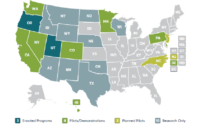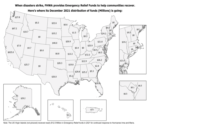The Federal Highway Administration has awarded $18.7 million to eight projects around the country in the latest round of grants for further tests of new types of road-user charges, or RUCs, such as a fee for vehicle-miles traveled (VMTs).
The new batch of Surface Transportation System Funding Alternatives (STSFA) grants, announced on March 16, come as Senate and House lawmakers have begun planning a new surface transportation bill. Lawmakers are mulling whether to launch a new wide-ranging test of VMT-type fees in that legislation.
FHWA also is working on a feasibility study, concentrating mainly on "how a potential national pilot mileage-based user fee system could even, if at all, be carried out," an agency spokesperson told ENR via email. FHWA "has reached out to experts to gather input" for that study," the official said.
The spokesperson added, "The study itself, however, does not involve developing or conducting a pilot."
The largest grant in the latest STSFA round is $5 million to the Texas DOT for to test the use in Dallas-Fort Worth of a smartphone-based alternative to the present gasoline tax.
The second-largest award, of $4.7 million, went to the Delaware DOT and the Eastern Corridor Coalition, to test so-called implementation paths for mileage-based user fees in the District of Columbia and seven states along the Interstate-95 corridor.
Other newly awarded grants include $3.3 million for a plan led by the Kansas DOT, working with the Minnesota DOT, to study the effects of a road-user charge in the Midwest.
California DOT (Caltrans) will receive a $2.2-million STSFA grant to test the use of global positioning system technology to identify which roads would be part of a network on which usage fees might be charged.
The Ohio DOT is getting $2 million to gather data for a major public outreach program for road user charges.
Utah DOT was selected to get $1.3 million to evaluate 3-D modeling software, e-Construction, drones and other technologies in testing user-based fees.
The Hawaii DOT will receive $250,000 and the Oregon DOT—along with the other 16 states in the Road Usage Charge West consortium—will get $134,875 in STSFA grants.
Most of the state DOTs whose projects were picked in the new round of grants are repeat STSFA winners, including Caltrans, Delaware, Hawaii, Minnesota, Oregon and Utah.
The program was established in the 2015 Fixing America’s Surface Transportation, or FAST, Act and awarded its first grants in 2016.
In all, since the STSFA program was launched, FHWA has awarded $73.7 million to 37 projects around the country.
Congress faces a Sept. 30 deadline for passing a new highway-transit bill.
What prompts the look at VMTs and other usage charges now is the widespread awareness that the longstanding current financing system that relies mostly on motor-fuels taxes that don't generate enough revenue to keep the Highway Trust Fund solvent.
The reasons for the shortfall include the rise of electric vehicles and hybrids and conventional vehicles’ increased fuel efficiency.
Senate Environment and Public Works Committee Chairman Tom Carper (D-Del.) said on March 17 his panel plans to hold a hearing on April 14 to gather information about allowing all 50 states to carry out pilot programs for VMTs.
Such a provision was part of a five-year highway bill that the committee approved in 2019. But that legislation failed to get a floor vote before the end of the 116th Congress.
In the House, Transportation and Infrastructure Committee Chairman Peter DeFazio (D-Ore.) supports a 50-state VMT pilot program.
Rep. Sam Graves, (Mo.), the House committee’s top Republican, is a particularly strong advocate for VMTs. He told a Feb 24 American Association of State Highway and T ansportation Officials meeting that a VMT system “could be done right now, with the technology that we have.”
Story updated in 3/22/21 with information about FHWA study on feasibility of a national mileage-based user fee system.





Post a comment to this article
Report Abusive Comment